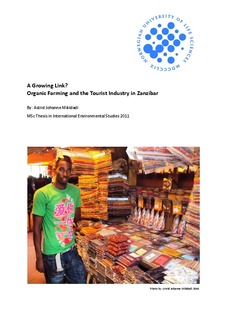| dc.description.abstract | Since Zanzibar opened up for tourism in the late 1980s, the industry has remained fairly detached from other spheres of society. Very few Zanzibaris are employed in this fast growing, high income industry. Moreover, a connection is especially lacking with the agricultural sector. The direct effect of this missing link is a deficiency in supply of locally produced agricultural products to hotels and restaurants. Recently, many organisations and some government agencies have started to focus on organic farming in Zanzibar, based on various health, environmental, economic, and market related incentives. Empirical data that helps to delineate the relationship between (organic) agriculture and the tourism industry in Zanzibar is currently limited. This thesis utilizes the methodology of political ecology, including stakeholder analysis, to map key actors in Zanzibar’s organic farming and organic tourism sectors, to search for connections amongst them and to explore the rationale behind their involvement. Through the application of a case study approach, this study seeks to uncover how organic farming operates as well as the difficulties and benefits of practicing it in Zanzibar. Furthermore, it aims to assess the contribution of organic farming (for tourism) to socio-economically and environmentally sustainable development for Zanzibari farmers.
Holistic analysis of the organic farming and organic tourism sectors reveals several key findings. Firstly, agriculture in Zanzibar is based on traditional farming methods, which some label as ‘organic by default’. Secondly, the dominant rationale for all stakeholders in organic farming in Zanzibar is the health benefits. Thirdly, amongst others, the functioning of the market, seasonality, small, unstable produce and unsuitability of temperate varieties are major constraints for organic farmers and tourist operators alike. Fourthly, local and organic food is used and marketed by a few socially and organically inclined tourist operators. Lastly, organic farming leads to improved knowledge, productivity and profitability and therefore contributes to socio-economically and environmentally sustainable development for farmers. | no_NO |
